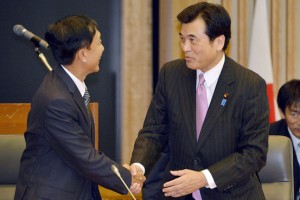New Lending Must Address Challenges on Burma’s Road to Development
By Burma Partnership • October 15, 2012 On 11 October, Japan announced that it would be resuming loans to Burma. It also hinted that it will assist the heavily indebted country in clearing its arrears and establishing good financial standing with international financial institutions, such as the World Bank and the Asian Development Bank.
On 11 October, Japan announced that it would be resuming loans to Burma. It also hinted that it will assist the heavily indebted country in clearing its arrears and establishing good financial standing with international financial institutions, such as the World Bank and the Asian Development Bank.
Japan will be forgiving US$3.7 billion or about 60% of the total $6 billion debt Burma owes; it is also planning to use bridge loans by Japanese banks to help clear Burma’s $900 million of arrears with the World Bank and the Asian Development Bank. Japanese Finance Minister Koriki Jojima stated, “Japan is planning to resume its full program in Myanmar with yen loans to help support Myanmar’s sustainable economic development…at the earliest possible timing next year.” He further explained that Japan’s development priorities in Burma would focus specifically in the areas of electricity and road rehabilitation, rural development and improvement of port facilities.
At this moment in time, Burma’s re-entry into the world economy, specifically the ability to take loans from institutions such as the World Bank, the Asian Development Bank and Japan itself, carries great risk. The type of projects to be funded, the rate of investment, the sectors in which investment will take place, the presence of monitoring mechanisms, and the decision-making process are just some of the factors that will determine the long-term outcome of international financial support.
One of the main concerns in the opening of financial liquidity is that development or, more specifically, a notion of economic growth is being prioritized over lasting political solutions that will lay the essential groundwork for a peaceful and prosperous Burma. Development should not be a substitute for political settlement to the decades long conflict with the country’s ethnic nationalities.
These new loans are being planned as conflict still rages in Kachin and northern Shan States. In many cases, ceasefire agreements have not been signed or have been disregarded, and crucial issues including ethnic political rights, natural resource management and other root causes of armed conflict remain unaddressed.
In order for financial assistance from the World Bank, the Asian Development Bank and donor countries such as Japan, to be successful great care must be taken so that the initiatives support rather than undermine the peace process and democratic transition. Donors must strive for maximum transparency, strong anti-corruption standards, meaningful consultations with all relevant civil society groups and community representatives, stringent risk assessment protocols and high standards of monitoring.
Burma and its international donors are in the unique position to learn from the experiences of transition from other countries in the region, including Cambodia, Sri Lanka and East Timor. Hopefully with correct planning and implementation, the very real opportunities can be seized while avoiding the very real pitfalls on Burma’s road to peace, development and democracy.
Tags: Asian Development Bank, Burma Partnership, Development, International Financial Institutions, Japan, World BankThis post is in: Aid and Development, Blog
Related PostsAsian Highway Project Undermines Peace in Karen State
Bridge Loans to the Republic of the Union of Myanmar
Campaigners Criticise “Premature” Burma Debt Cancellation
Myanmar in Transition: Opportunities and Challenges
The ADB in Burma: Behind the Scenes









 All posts
All posts